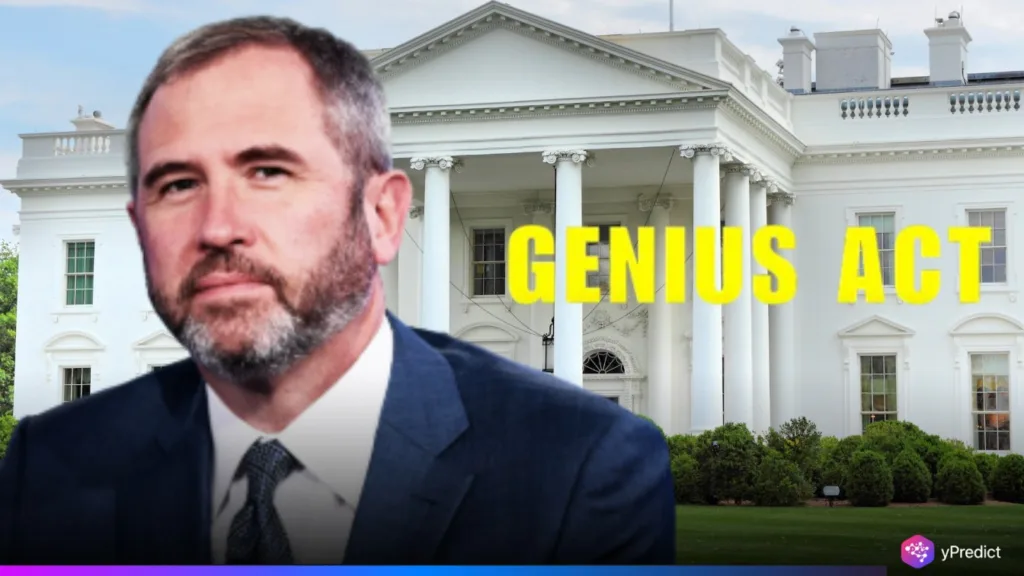
Ripple CEO Brad Garlinghouse made news this week as he attended the signing of the GENIUS Act alongside lawmakers and officials on the White House lawn. The GENIUS Act would regulate the stablecoin market, which is worth $250 billion! This represents a significant shift in the U.S. attitude towards digital assets, especially in how it is going to regulate the intersection between artificial intelligence and blockchain.
Garlinghouse’s appearance wasn’t just symbolic. Ripple, long entangled in a legal battle with the SEC, now finds itself in a potentially more favorable climate. The GENIUS Act could streamline AI-driven financial compliance, giving Ripple and other blockchain firms a clearer regulatory path. But with political and financial influences swirling around the law, critics aren’t staying silent.
Crypto Wealth and AI-Driven Political Strategy
A central point of contention is the growing connection between AI, crypto lobbying, and political influence. The Trump family, according to recent reports, saw a staggering $2 billion gain in crypto-related wealth. Just days before the GENIUS Act passed, Trump-linked World Liberty Financial tokens went live for trading on July 16, 2025. Critics argue this timing appears far from coincidental. While the GENIUS Act positions itself as a tech-forward law introducing AI-led regulation into digital assets, the clear financial interests of political figures complicate its perception.
The White House has not commented on these concerns directly, but Garlinghouse’s prominent role in the ceremony suggests alignment between Ripple’s AI-integrated blockchain vision and the government’s new stance. The AI angle is key here. The law doesn’t just regulate stablecoins — it introduces AI systems into real-time risk assessment and automated compliance. This plays to Ripple’s strengths, particularly its vision for AI-backed cross-border transactions and data security.
Ripple’s Legal Shadow and the AI Advantage
Since 2020, Ripple has fought a high-profile battle with the SEC over alleged unregistered XRP sales. Brad Garlinghouse, the Ripple CEO, has continually argued that outdated financial frameworks fail to grasp the speed and intelligence of blockchain-based solutions, especially those infused with AI. Now, with the GENIUS Act formalizing AI’s role in crypto oversight, Ripple could gain the upper hand.
Legal experts suggest the act may indirectly ease SEC pressure by offering Ripple an opportunity to demonstrate AI-led compliance in real time. This doesn’t end the case, but it certainly changes the tone. Garlinghouse didn’t address the SEC lawsuit directly at the White House. However, insiders noted his strategic conversations with lawmakers focused heavily on Ripple’s AI infrastructure and its role in reshaping the global financial system. The GENIUS Act, then, serves both as a regulation and potential relief.
LSE Findings Undermine Garlinghouse’s Past Claims
While the GENIUS Act offers a new horizon for Ripple, past claims continue to haunt its leadership. Back in 2020, Brad Garlinghouse stated that SWIFT transactions had a 6% error rate — a claim that positioned Ripple’s AI-enhanced solutions as a much-needed upgrade. However, researchers at the London School of Economics (LSE) soon disputed this figure, finding the error rate overstated, therefore unmasking Garlinghouse’s story. In light of the new legislation, critics believe this may indicate an overall strategy of timing AI adoption discourse to legislative timing.
Regardless of this discrepancy, Ripple has stayed in forward motion with its tech stack. Its current strategy leans heavily into AI-driven mechanisms for monitoring compliance, preventing fraud, and forecasting liquidity. In that sense, Garlinghouse’s message has shifted from comparative critique to showcasing AI-powered financial transformation.
AI Sets the Tone for the Future of Ripple
With the GENIUS Act now law, Ripple and its CEO appear better positioned to influence the regulatory direction of crypto assets in the U.S. Brad Garlinghouse’s role at the White House signals more than symbolic support. It reflects a broader alignment between Ripple’s AI-centered mission and Washington’s evolving financial strategies.
Nonetheless, skepticism still exists. The combination of political capital, individual wealth, and AI technology raises concerns about fairness and how things will be done transparently. However, as lawmakers adopt smarter, AI-enabled compliance models, Ripple appears to be ready to lead that evolution, litigation, critics, and controversy notwithstanding.






